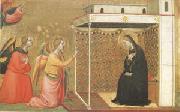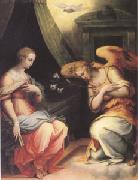Wholesale Oil Painting No Minimum |
|||||||||||
|
|
|||||||||||

|
|||||||||||
|
|
|
||||||||
Bernardo Daddiactive in Florence 1320-1348 was an early Italian renaissance painter and apprentice of Giotto. He was also influenced by the Sienese art of Lorenzetti. Daddi's birth date remains unknown. He is first mentioned in 1312. He focused on religious motifs and altarpieces. A triptych he painted in 1328 is in the Uffizi, and there are several panels in National Gallery of Art and the Walters Art Gallery. Daddi became the leading painter of Florence during his generation. His last work dates from 1347, |
||||||||
|
|
||||||||
The Annunciation (mk05)
The Annunciation (mk05) Painting ID:: 19967 |
Wood,17 1/4 x 28''(44 x 71 cm). Campana Collection,Rome entered the Louvre in 1863 .M.I 393 Wood,17 1/4 x 28''(44 x 71 cm). Campana Collection,Rome entered the Louvre in 1863 .M.I 393 |
|||||||
|
|
||||||||
LORENZO DI CREDIItalian High Renaissance Painter, ca.1458-1537 |
||||||||
|
|
||||||||
|
|
The Annunciation (mk05)
The Annunciation (mk05) Painting ID:: 20056 |
Wood 6 1/4 x 23 1/2''(16 x 60 cm)Campana collection Rome entered the Louvre in 1863 Wood 6 1/4 x 23 1/2''(16 x 60 cm)Campana collection Rome entered the Louvre in 1863 |
||||||
|
|
||||||||
VASARI, GiorgioItalian Mannerist Writer and Painter, 1511-1574 Italian painter, architect, and writer. Though he was a prolific painter in the Mannerist style, he is more highly regarded as an architect (he designed the Uffizi Palace, now the Uffizi Gallery), but even his architecture is overshadowed by his writings. His Lives of the Most Eminent Architects, Painters, and Sculptors (1550) offers biographies of early to late Renaissance artists. His style is eminently readable and his material is well researched, though when facts were scarce he did not hesitate to fill in the gaps. In his view, Giotto had revived the art of true representation after its decline in the early Middle Ages, and succeeding artists had brought that art progressively closer to the perfection achieved by Michelangelo. |
||||||||
|
|
||||||||
|
|
The Annunciation (mk05)
The Annunciation (mk05) Painting ID:: 20315 |
Wood,85 x 65 1/4''(216 x 166 cm)From a church in Arezzo 1813;entered the Louvre in 1814 INV Wood,85 x 65 1/4''(216 x 166 cm)From a church in Arezzo 1813;entered the Louvre in 1814 INV |
||||||
|
|
||||||||
|
VASARI, Giorgio Italian Mannerist Writer and Painter, 1511-1574 Italian painter, architect, and writer. Though he was a prolific painter in the Mannerist style, he is more highly regarded as an architect (he designed the Uffizi Palace, now the Uffizi Gallery), but even his architecture is overshadowed by his writings. His Lives of the Most Eminent Architects, Painters, and Sculptors (1550) offers biographies of early to late Renaissance artists. His style is eminently readable and his material is well researched, though when facts were scarce he did not hesitate to fill in the gaps. In his view, Giotto had revived the art of true representation after its decline in the early Middle Ages, and succeeding artists had brought that art progressively closer to the perfection achieved by Michelangelo. The Annunciation (mk05) Wood,85 x 65 1/4''(216 x 166 cm)From a church in Arezzo 1813;entered the Louvre in 1814 INV |
||||||||
|
|
||||||||
|
Prev Next
|
||||||||
|
|
||||||||
|
Related Paintings to VASARI, Giorgio :. |
||||||||
|
|
||||||||
|
CONTACT US |



